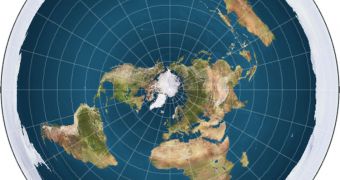Our planet has a long time ago been established to be round. Subsequent researches have confirmed this fact over and over again, and yet there are still those that doubt it, and claim global conspiracies to cover some mysterious thing up. But, while most educated people laugh at these lunatics, they too tend to consider Earth as a flat surface in their heads, according to a new scientific study. A surprisingly high portion of the general population cannot seem to get, at the most basic level, its mind around the fact that we are not living on a dish, LiveScience reports.
In the new investigation, more than 40 test participants were asked to give approximate distances between six cities in the world, all of them on different continents. The team behind the work asked the subjects to give their estimates in kilometers, but were surprised to learn that most of the people they asked to do this tended to calculate the distances as if they were in a straight line. In other words, they failed to account for the curvature of the planet, which would have increased these estimates considerably. The scientists admit that the Earth is not perfectly spherical, resembling more a beach ball that's been squashed, but say that, regardless, participants should have known better.
The differences in estimated distances appear simply because the shortest distance between two straight points is a line. IF the Earth were flat, then this would be the case, and most test subjects would have successfully completed their assignment. But, on the surface of a spheric body, the shortest distance is a curved line, which is considerably longer, when unfolded, than a straight one between the same two points. “Ninety-nine percent of all people think that of course the Earth is round, because they have learned it in school. But the thing is, this doesn’t solve the cognitive problem of whether people really base calculations of routes on such a model,” explains University of Bamberg expert Claus-Christian Carbon, who was a part of the team that conducted the new investigation.
“What we found was really a very big surprise for us, because I had the feeling that most estimations are based of course on a spherical world. The fantastic thing was, it does not matter at all whether you have a very good geographical knowledge. We could have knowledge about things, but to really apply this knowledge you need personal experiences. This is really transferable to many domains where we also have knowledge about something, but we cannot apply it,” he adds. Details of the new scientific study appear in the latest issue of the esteemed scientific journal Cognition.

 14 DAY TRIAL //
14 DAY TRIAL //